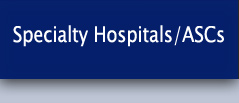|
Historically, surgical
complications were thought to be unavoidable —an accepted risk
of the practice. The lack of effective systemization makes it difficult
for healthcare professionals consistently to provide the highest
levels of care in the surgical and post-surgical arena. In an effort
to promote an integrated, systematic, and standardized approach
to reduce surgical complications, Clinical Risk Solutions, Inc.
provides on-site comprehensive clinical risk assessments--a proven
methodology to achieve a patient safety-centered model of excellence.
Clinical
Risk Solutions will partner with your organization to develop and
implement strategic initiatives that focus on care standardization,
surgical/clinical operational efficiency, team culture, communication,
documentation, regulatory compliance, and the development of a patient
safety-centered model of excellence.
Focus areas of review
and organizational program development include the following opportunities:
|
Physician
Practice and Regulatory Assessment
- Enhance physician
practice organizational structures to integrate quality, safety,
regulatory compliance, and risk management
- Conduct Clinical
Risk Assessment: comprehensive clinical risk assessment of the
practice structures and regulatory compliance.
- Regulatory Compliance:
- Centers for Medicare
& Medicaid Services (CMS)
- Recovery Audit Contractor
(RAC) review
- Health care fraud
and abuse
- "Anti-Kickback"
law
- Stark I & II
- Corporate Compliance:
- Audit tools and training
- Professional liability
insurance brokerage services:
- Broker RFP process
and selection criteria
- Broker performance
measures
- Bioethics/medical conflict
- Medical mediation and
conflict resolution process
|
|
Medical
Staff Structure Review
- Credentialing: re-credentialing,
clinical privileging
- Bylaws: rules and
regulations
- Peer review process:
- Ongoing and focused
professional performance evaluation (OPPE and FPPE)
- Competencies (ACGME)
and the Joint Commission:
- Medical knowledge
- Patient care
- Interpersonal and
communication skills
- Professionalism
- Systems based practice
- Practice-based learning
and improvement
- The Joint Commission
and CMS
- Standard survey
readiness/tracer methodology
- Standard interpretation
and resource tools
- Physician leadership
training
- Hospital leadership
and medical staff relationships
- Conflict of interest
- Professional behavior
- Adverse event disclosure
|

